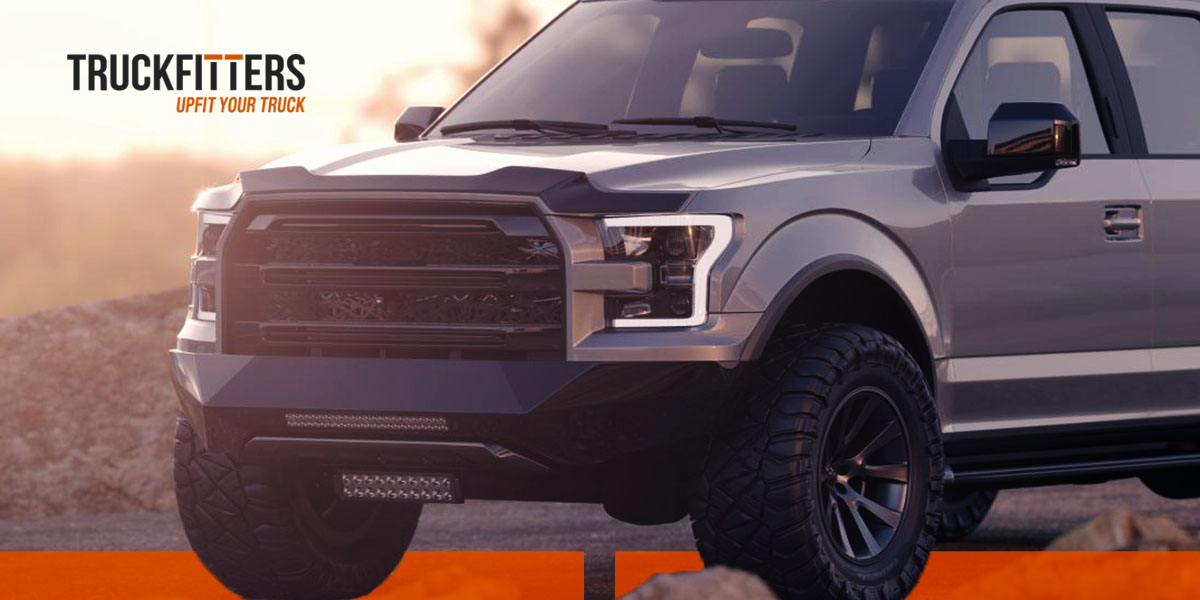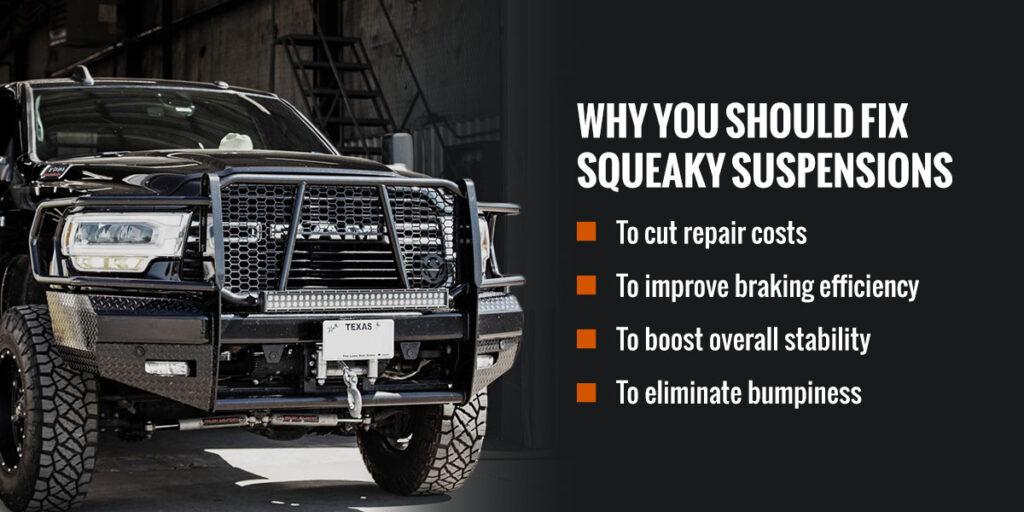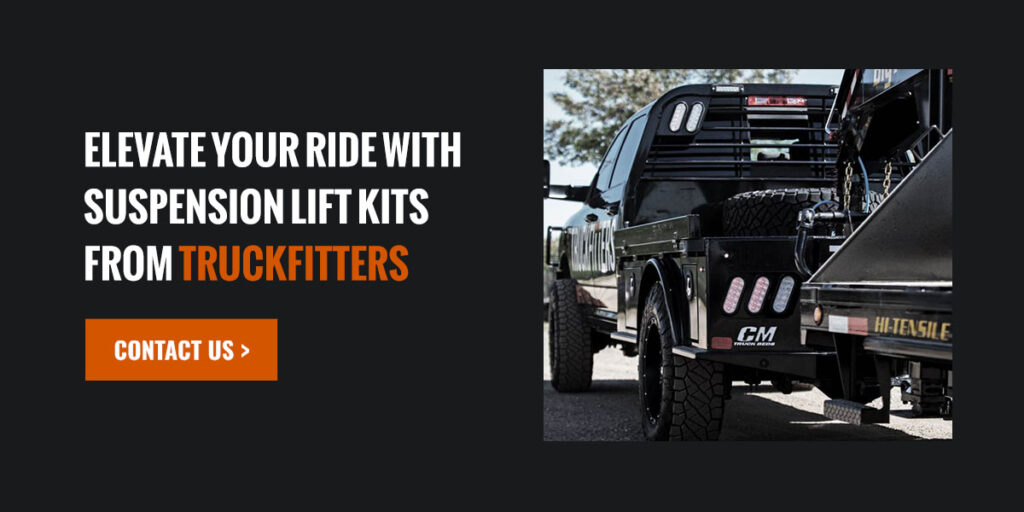

Your vehicle should provide a smooth riding experience regardless of the surface you’re driving on. While it’s normal to hear different noises, like vibrations due to uneven road surfaces, squeaking is not part of normal driving, even when you’re rolling over stones and bumps. A squeak is a particular sound that often indicates a mechanical issue.
If you can hear your suspension squeaking, there’s usually an issue with its attached components, such as bushings, ball joints and rubber mounts. Should you be concerned about the noises? Absolutely, because mechanical issues that go unchecked can lead to bigger issues that undermine your safety. This guide dives into the causes of squeaky suspensions and how to fix them.
Diagnosing a squeaky suspension can be challenging. The best way to find the culprit is to review the possible reasons and rule them out as you go. The suspension system has various components that work in sync supporting many functions that result in comfort and safety when driving. One of these parts could be the source of the creaking.
Ball joints are crucial parts that can move in multiple directions to support the range of motion in your vehicle. They feature a metal socket with an enclosed ball stud that moves around as needed. Since they allow the wheels to move freely and bear much of the work associated with movement, they’re prone to wear and tear. When ball joints wear out, space develops inside the socket. One of the signs of a worn ball joint is squeaking or clunking noises, which means the ball stud is loose.
Bushings are crucial components made of rubber or other materials that support flexibility within the suspension and steering systems. You can locate these rubbery materials in the control arms, tie rods, stabilizer bars, ball joints, strut mounts and shock absorbers. Since they control movement in the joints, they cushion your vehicle from vibrations and protect the metal joints from friction. Bushings are greased, and if they dry up or crack, you’ll notice issues like irritating noises and poor handling.
Coil springs are connected to struts, and their primary role is to absorb shock, which the strut helps to dampen. They take on the heaviest part of the shock absorbing through fluid movements, but that also means it can break down at any time, and you’ll know it has when you notice the squeaking when you accelerate, drive over bumps and drive around corners.
Shocks are responsible for dampening the rebound motion of coil springs, ensuring stable driving. Like coil springs, their function is heavy, so they’ll wear out over time. Damaged or worn-out shocks can squeak. Dirt and debris may also cause squeaky shocks.

Your vehicle’s suspension system is vital to your safety and comfort while on the road. It’s always best to fix your suspension issues before you resume driving for various reasons. Here are reasons you should fix a squeaky suspension:
With creaky suspensions, time is of the essence. You want to curb the damage before it extends to other parts and keep your vehicle in good condition. The issue with suspension repair work is locating the source of disturbance, which may not be straightforward for everyone. Unless you can isolate the cause of the creaking and handle it, it’s best to bring in a professional mechanic.
If a lack of lubrication is the reason for the noises, silicone lubricants, silicone grease and even lithium-based grease can resolve the issue. Lubricating suspension bushings may call for silicone or lithium grease since they are compatible with rubber and contain high-performing lubricating properties. Remove the tire within the noise area, spray the bushings and let the rubber soak for a while before driving again. You may want to use a water-resistant silicone lubricant for the shock absorber, as it has excellent properties and doesn’t attract dirt.
Vehicles equipped with grease fittings allow internal lubrication for those parts you can’t reach externally. Inject the fittings with quality silicone grease and see if that works.
Sometimes, the best solution is to replace the parts responsible for the creaking, as lubrication is not always the answer. Worn-out or damaged parts need to be replaced to maintain the performance of your entire suspension system. You may want to seek professional assistance in identifying the cause of the noise to ensure you replace parts that need replacing and not those that don’t.
Since prevention is better than cure, one of the measures you can take is to strengthen the suspension. You can use lift kits for suspensions to raise your vehicle’s height and create more distance between it and the ground. Keep in mind that lift kits are not limited to truck suspensions.
If you’re wondering why your suspension is squeaking, a quick answer is that one or more of its components are faulty. You’ll have to locate the source of the noise or get professional help. Sometimes, the issue is minor, such as a lack of lubrication or a damaged rubber bushing, in which case lubricating and replacing the small component gets you back on track. It can also be a more serious issue, such as multiple components failing. Either way, getting your vehicle to a mechanic is the ideal solution.
As a truck owner or fleet manager, you may want to upgrade your vehicles with top-of-the-line parts to boost their functionality and aesthetics. We are a dedicated team of experts in unfitting with extensive industry knowledge. Truckfitters boasts a large inventory that includes suspension reinforcement solutions. Contact Truckfitters for your truck equipment and accessories today and enjoy flexible solutions!
